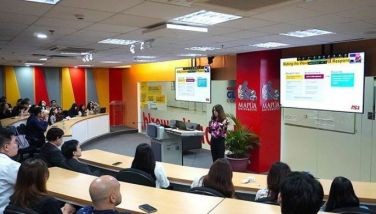Tagalog all the way

I was born and I grew up in an Ilokano village in eastern Pangasinan. In that part of the province and from there all the way to the Northern tip of Luzon, Ilokano is the lingua franca. In 1938, I moved to Manila for high school and it was here where I learned Tagalog, but the everyday Tagalog of Manila.
Tagalog and Spanish were taught while I was in college back in 1946. I almost flunked Tagalog with its “Balarila.” I came to realize the difference between my Tagalog and the Tagalog being taught in schools, and why it was not widely accepted as the national language, not only for ethnic reasons but also because it was purist.
Language is organic; it either grows or dies. The Oxford English Dictionary does a quarterly update with new words, colloquialisms. If you read the original Beowulf, the English epic written a thousand years ago, you will not understand a single word. I think President Quezon, because he was Tagalog, made a very big mistake in electing Tagalog as national language. Earlier, Spanish and English were accepted by us because both languages made all of us equal.
In the 1950s, I travelled all over the country, from Sabtang in the Batanes group in the north to Sitangkai in the Tawi-Tawi group in the south. In those days, Tagalog was not spoken in non-Tagalog regions. I communicated in English. Thank God, English was already understood by many Filipinos, especially those in official positions. But in the past 50 years, media – particularly movies, radio, and television – and the public schools, have turned Tagalog into a real national language. And during the recent senatorial election campaign, I watched non-Tagalogs give speeches and debate in a Tagalog far better than mine.
The final ruling of the Supreme Court making Filipino (Tagalog) no longer a required college subject is absolutely correct. I think now is the time to make Tagalog the sole language of instruction from grade school to graduate school, and also the official language in government and in the courts. This Tagalog will be understandable, and will not be the Tagalog espoused today by the Commission on Language.
I know that such a monumental change will cause many difficulties and expense, and it is for these reasons why the transition will have to be carefully calibrated for at least 25 years. This will mean the gradual rewriting of textbooks and of procedures in government. Business will follow inevitably.
English should be phased out slowly to become like any of the foreign languages – Spanish, German, Japanese – taught in special schools. This change will be a daunting job for our Tagalog teachers. Many of them must change their mindset in order to turn Tagalog into Filipino. Many non-Tagalog words like balay (house), taytay (bridge), and bulan (moon) should be incorporated into the national language as mandated by law.
When I was with the old Manila Times, I received a copy of the Tagalog newspaper, Taliba, every day. I could not read it. I told the publisher of the Manila Times then, Joaquin P. Roces, to make Taliba more understandable with the use of Manila Tagalog, not the archaic Tagalog of Balagtas. When that change was made, the Taliba circulation surged from a few thousand to more than twenty thousand.
Twenty years ago, I managed a translation program wherein books in Japanese were translated into Tagalog. The books did not sell as indeed even today Tagalog translations of books – including mine – are not selling. This does not mean we should stop trying. Look at how successful the Indonesians and Malaysians have been with Bahasa.
Let me recount how Bahasa became the national language of Indonesia and Malaysia. It was modernized and also made literary, and broad and rich enough for intellectual and scientific discourse. Takdir Alisjahbana, the Indonesian writer and scholar, and a significant influence on the modernization of Bahasa, told me how it came to be Indonesia’s national language.
When the leaders of the Indonesian independence movement were discussing their national language in the 1920s, they could have easily opted for Javanese. Most of the leaders themselves were Javanese but were educated in Dutch. But they realized that if Javanese became the national language there would be objections from the other language groups. So they elected Bahasa, which was used mainly in trading centers. They accommodated international words – ethnography became etnograpi, anthropology became antropologi, science became sains, and so on. This is a very good model for us to emulate, to use widely accepted terms instead of words like lungsod, pamantasan, mataas na paaralan, aklat, and so on.
I can think of no people more nationalistic than the Japanese, but they have Japanized many foreign terms.
In the 1950s, the writer, Rodrigo Perez, knowing the Indonesian example, suggested Tausug as our national language. Like English and Spanish, it would have been accepted because Tausug is such a tiny minority language spoken only by the Tausug of Sulu. It would have brought us closer to Indonesia but most important, it would have dampened or banished altogether the Moro separatist movement.
The first Tagalog novel I’ve read in its entirety is Lualhati Bautista’s Dekada 70. I am very happy with her translation of my novel, Mass. She uses “alarm clock” instead of “relos ng panggising.” This is how it should be.
I’m only too aware that language carries with it a lot of cultural baggage, but this cultural baggage should enrich our language, not diminish it. As a writer in English, I hope that much of what I have written can be translated into Tagalog, so too the works of those writing in Filipino languages such as Bicolano, Cebuano, and Ilokano. This is a formidable task particularly for our Tagalogs who despair over the Supreme Court decision. Then Tagalog shall have become truly “Filipino” and no longer a euphemism.
- Latest
- Trending





















